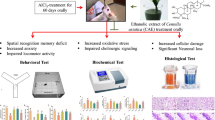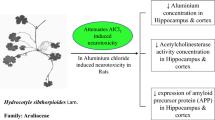Abstract
Objective: To examine the protective effect of Ginkgo biloba leaf extract (GbE) on learning and memory deficit induced by aluminum chloride (AlCl3), and explore its mechanisms.Methods: The rat models with learning and memory deficit were induced by administering via gastrogavage and drinking of AlCl3 solution. And the model rats were treated with GbE at the dose of 50, 100, 200 mg/kg every day for 2 months accompanied with drinking of AlCl3 solution, respectively. Their abilities of spatial learning and memory were tested by Morris water maze, and the acetylcholinesterase (AChE) activity in serum was assayed with chemical method, the AChE expression in hippocampus was observed by immunohistochemistry assay, and then quantitative analysis was done by Bl 2000 image analysis system.Results: Learning and memory deficit of rats could be induced by AlCl3 solution (P<0.01), and AChE expressions in rats hippocampus were increased (P<0.01); GbE ameliorated learning and memory deficit and reduced AChE expression in rats hippocampus in a dose-dependent manner, while GbE significantly increased serum AChE activity at the dose of 200 mg/kg each day (P<0.05).Conclusion: GbE can ameliorate learning and memory deficit induced by AlCl3, which may be due to its inhibition of the AChE expression in hippocampus.
Similar content being viewed by others
References
Altmann P, Dhanesha U, Hamon C, et al. Disturbance of cerebral function by aluminum in haemodialysis patients without over aluminum toxicity. Lancet 1989; 2 (8653): 7–12.
Schreeder MT, Favero MS, Hughes JR, et al. Dialysis encephalopathy and aluminum exposure: an epidemiologic analysis. J Chronic Dis 1983; 36(8): 581–593.
Bolla Kl, Briefel G, Spector D, et al. Neurocognitive effects of aluminum. Arch Neurol 1992; 49(10): 1021–1026.
Bilkei-Gorzo A. Neurotoxic effect of enterai aluminum. Food Chem Toxicol 1993;31(5): 357–361.
Zatta P, Ibn-Lkhayat-ldrissi M, Zambenedetti P, et al.In vivo andin vitro effects of aluminum on the activity of mouse brain acetylcholinesterase. Brain Res Bull 2002; 59 (1): 41–45.
Zubenko GS, Hanin I. Cholinergic and noradrenergic toxicity of intraventricular aluminum chloride in the rat hippocampus. Brain Res 1989; 498(2): 381–384.
Fibiger HC, Damsma G, Day JC. Behavioral pharmacology and biochemistry of central cholinergic neurotransmission. Adv Exp Med Biol 1991; 295: 399–414.
Sastre J. Millan A, Garcia de la Asuncion J, et al. Ginkgo biloba extract (EGb 761) prevents mitochondrial aging by protecting against oxidative stress. Free Radic Biol Med 1998; 24(2): 298–304.
Wettstein A. Cholinesterase inhibitor and ginkgo extracts in therapy of dementia. A comparison of effectiveness based on controlled studies. Fortschr Med 1999; 117(5): 48–49.
Morris R. Developments of a water-maze procedure for studying spatial learning in the rat. J Neurosci Meth 1984; 11(1): 47–60.
Gage FH, Bjorklund A, Stenevi U. Intrahippocampal septal grafts ameliorate learning impairments in aged rats. Science 1984; 225 (4661): 533–536.
Gong QH, Wu Q, Huang XN, et al. Protective effects of Ginkgo biloba leaf extract on aluminum-induced brain dysfunction in rats. Life Sci 2005; 77(2): 140–148.
White DM, Longstreth WT Jr, Rosenstock L, et al. Neurologic syndrome in 25 workers from an aluminum smelting plant. Arch Intern Med 1992; 152 (7): 1443–1448.
Yen-Koo HC. The effect of aluminum on conditioned avoidance response in mice. Toxicol Ind Health 1992; 8 (1-2): 1–7.
Amberla K, Nordberg A, Viitanen M, et al. Long-term treatment with tacrine (THA) in Alzheimers disease- evaluation of neuropsychological data. Acta Neurol Scand Suppl 1993; 149: 55–57.
Kohila T, Parkkonen E, Tahti H. Evaluation of the effects of aluminum, ethanol and their combination on rat brain synaptosomal integral proteinsin vitro and after 90-day oral exposure. Arch Toxicol 2004; 78(5): 276–282.
Additional information
Supported by the Project of Governor Talent Foundation of Guizhou Province (No. 2001016)
Rights and permissions
About this article
Cite this article
Qi-hai, G., Qin, W., Xie-nan, H. et al. Protective effect of Ginkgo biloba leaf extract on learning and memory deficit induced by aluminum in model rats. Chin. J. Integr. Med. 12, 37–41 (2006). https://doi.org/10.1007/BF02857428
Received:
Issue Date:
DOI: https://doi.org/10.1007/BF02857428




